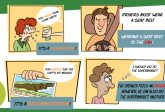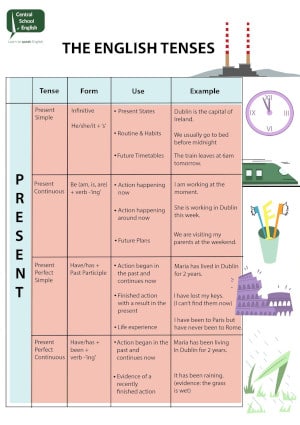Future Simple Tense
Where will you be in 5 years time?
Do you think about your future?
Or do you prefer to live in the present.
Even if you prefer to live in the moment, it is important to think about the future and when we are speaking about the future it is important to know the proper English grammar to use.
Decisions in the moment
In this blog we are going to talk about when to use the Future Simple Tense.
So what do we use it for? As you will see, we can use it for different situations, some very common situations.
What is it’s structure?
The Future Simple is just that, very simple:
will + (infinitive) go/be etc.
We use will to make a decision in the moment!
“Will you marry me?”
Not really, but you get the idea, right?
'Will' - Decisions
We use will + infinitive when we make a decision in the moment.
Lets imagine you live with a few housemates and there are a lot of chores to be done.Your housemate has a house meeting to try to decide who wants to do which job.
The options are:
Clean the living room
Do the washing up
Clean the bathroom
Take out the rubbish
If you like one option you can use the Future Simple and say, for example:
“I’ll do the washing up”
You made a decision in that moment so you used the Future Simple tense.
Another example might be in a restaurant.
You go to a restaurant, sit down and then the waiter or waitress comes to your table. They ask you what you would like to order. If you have already decided, you can say:
“I’ll have the Chicken Caeser Salad, please.”
You have just in that moment decided what to order.
Notice that in both these situations we used a contraction, I’ll. We form this contraction simply by adding ‘ll to the pronoun.
A quick reminder of this can be seen below:
I will I’ll
You will You’ll
He/She/It will He’ll/She’ll/ It’ll
We will We’ll
You will You’ll
They will They’ll
Don’t forget, we also need the infinitive without ‘to’!
e.g I’ll help you.
Test Yourself
- Your friend invites you to a party this Friday. What do you say?
- Alba tells Mark that she is feeling warm and Mark is sitting beside the window. What can he say?
- Your friend gets a phone call but the music is playing really loud in the room. What can you say?
Future Simple Tense for Predictions
We also use the structure will + infinitive to make a prediction about the future. If we use this structure we are guessing what the future will be.
If your friend tells you the are worried about a situation, you can comfort them by saying something like: “Dont worry! Everything will be ok.”
This is a common thing we say to our friends and people we love to comfort them by predicting that things will be ok.
We can also use this language to say what we think will happen, because, after all, we don’t know what the future holds. We simply use the word think to do this.
For example: Aron –“What do you think about this pandemic?”
Zach – “Well, I think it’ll get better soon.”
In this conversation we see that Zach is predicting what he thinks will happen.
Below you can find some more examples of predictions on what people think life will be like in the year 2030.
“In the year 2030 there will be people on Mars.”
“We will use flying cars by the year 2030.”
“There won’t be any poor people in 2030” (we use won’t for the negative)
Phrasal Verbs
To Figure out:
To find out a solution to a problem.
Example: Are you still trying to choose which course to study? Don’t worry, I’m sure you’ll figure it out.
Vocabulary
Housemate: Someone who we live with, who isn’t our family(friends/strangers)
Chores: jobs we do around the house such as washing, cleaning etc.
Do the washing up: This means to wash the plates, cups etc.
Thank you for reading our post. You’ll find more English grammar tips elsewhere on our site and if you’d like information on our English courses in Dublin, please do not hesitate to contact us.





